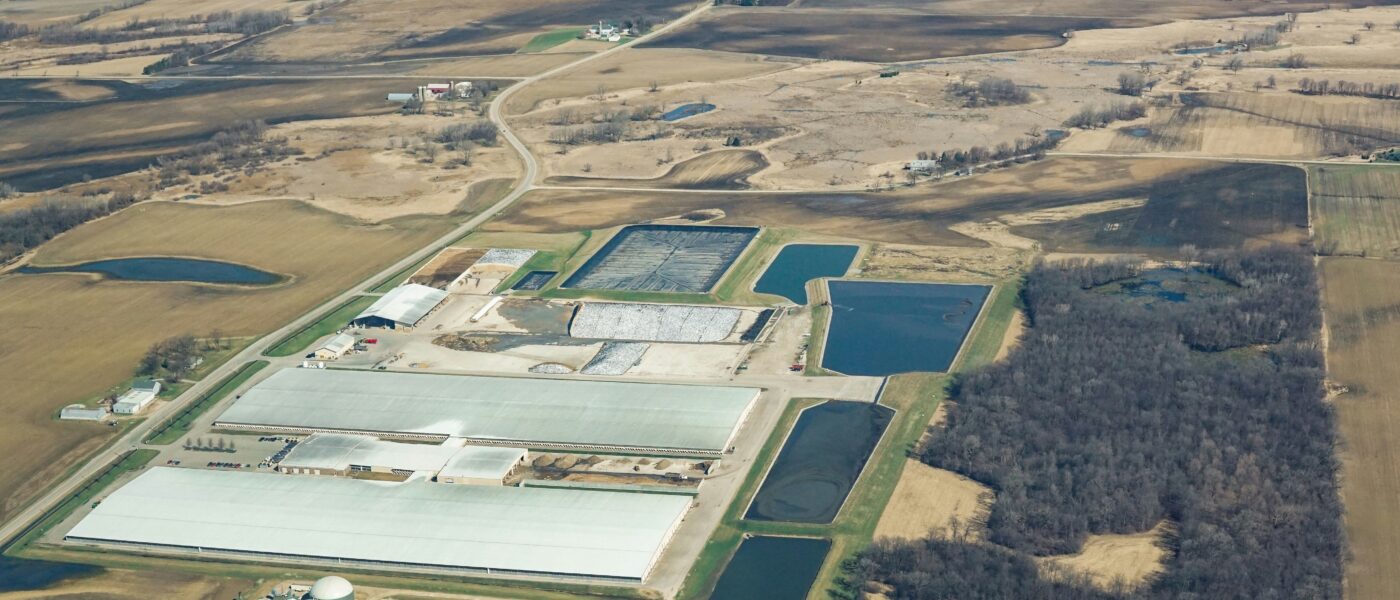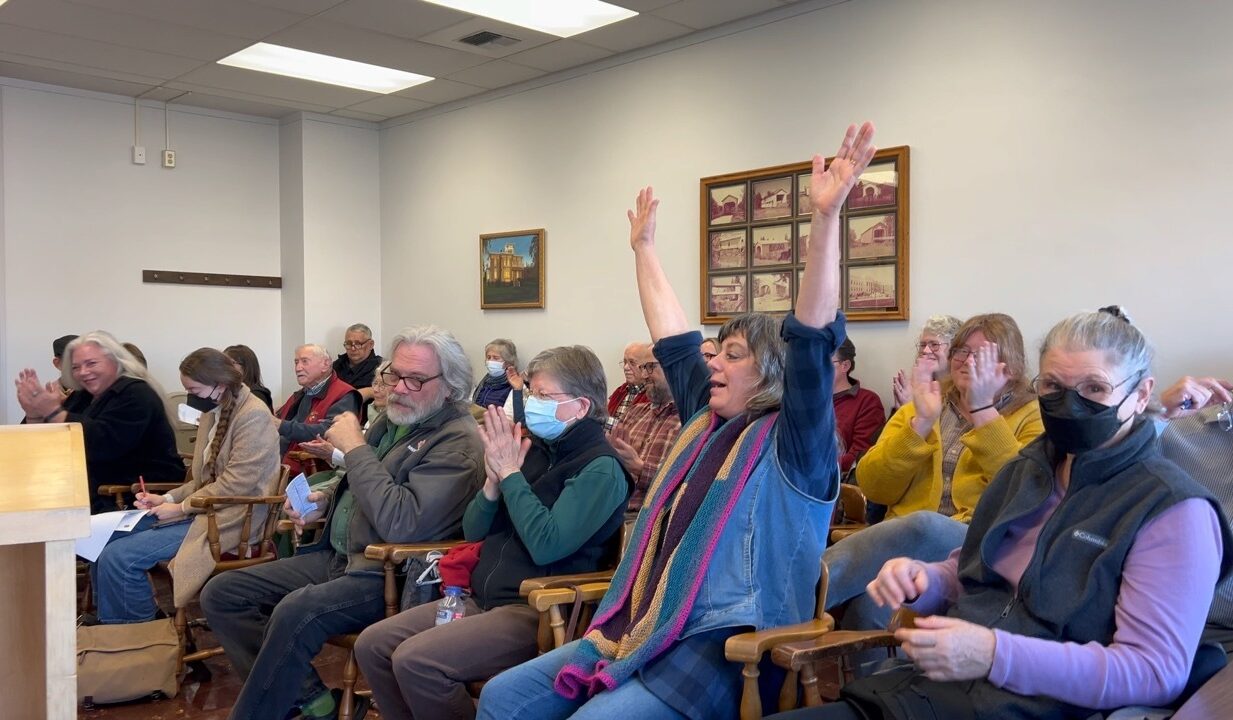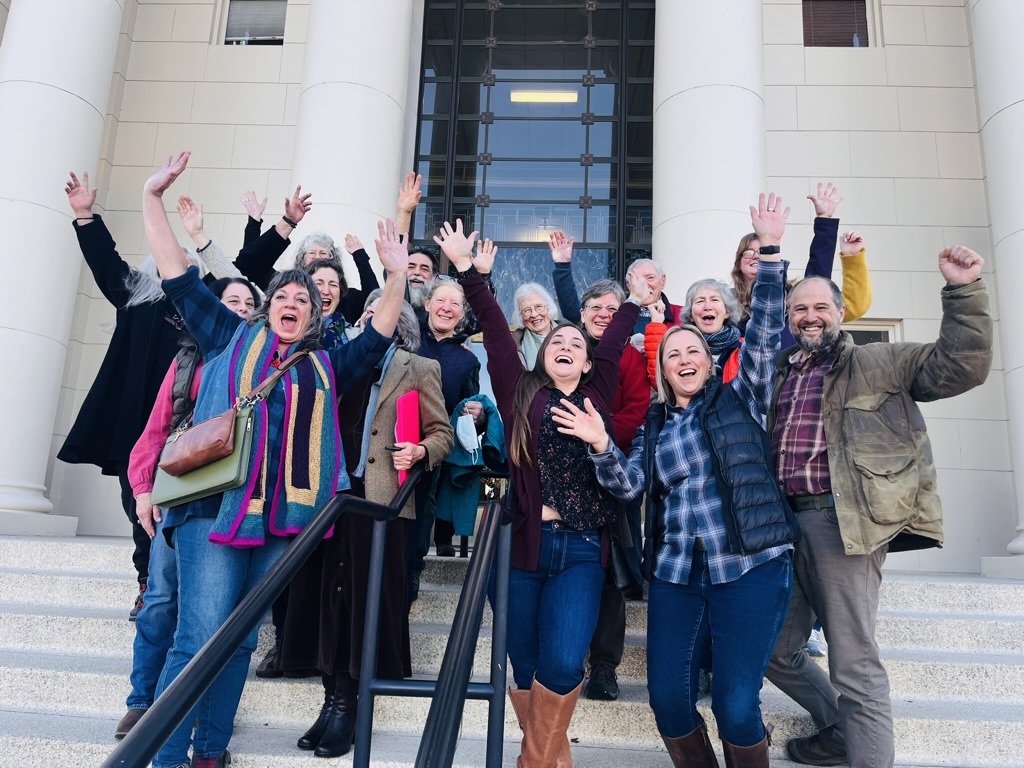Last year, grassroots organizers led important and successful efforts to curb the expansion and new construction of concentrated animal feeding operations (CAFOs), commonly known as factory farms. These localized wins are part of a larger grassroots movement working against industrial livestock production in rural communities around the country. Taken together, that movement is racking up a lot of momentum to shift the power from corporations to communities.
Several of Farm Aid’s partners played integral parts in winning campaigns against CAFOs in 2023. Since oftentimes these wins are recognized and celebrated in the local community, but not seen from a 10,000-foot view, we reached out to partners in Oregon, Indiana and Minnesota to get the scoop and show how these wins can reshape our farm and food from the ground up.
We hope that this effort will inspire other counties in Oregon (and maybe nationally!) to step up and do the same thing!” – Kendra Kimbirauskas, Farmer and Organizer
Linn County, Oregon
Linn County became the first county in Oregon to set new regulations that restrict where CAFOs can be sited after the state legislature passed CAFO regulatory reform (SB 85), which among other things returned some local control back to county governments when it comes to the siting of large-scale CAFOs. Linn County Commissioners passed the rules in December 2023, after local family farmers and community groups pressed the county to pass tighter restrictions on where large-scale CAFOs can be sited.
The fight to restrict CAFOs in the county was instigated by the proposal for two new mega Foster Farms poultry operations in Linn County and a third just over the county line in Marion County. Cumulatively, the three operations were slated to produce some 13-million broiler chickens annually and were to be sited next to farms, homes, rivers, an elementary school and an historic church, raising concerns about impacts on air quality, public health and water pollution.
The county received an overwhelming amount of support for the new rules in both written and public testimony at both the Planning Commission and County Commission public hearings. The community’s farmers voiced support for the commissioners to pass the new rules, many fighting back tears as they talked about their farms, some that had been in their family for multiple generations.
The Linn County commission decision was made following the passage of Oregon’s Senate Bill 85, a crucial and groundbreaking piece of legislation passed in June 2023. SB 85 ended an exemption that allowed CAFOs to use drinking water for their operations even if they didn’t have a permit or water right. It also strengthened the permitting process for the infrastructure and water supply plans that CAFOs must comply with before they begin operations and allowed the Department of Environmental Quality to regulate the air pollutants produced by these types of farms. Importantly, SB 85 gave counties the ability to implement setback restrictions for new CAFOs – this authority is what set the stage for the Linn County decision.
These two new policy decisions represent a victory for small farmers in Linn County and for the rest of Oregon. In an email announcing the news, Kendra Kimbirauskas, one of the lead organizers in Linn County, said, “We hope that this effort will inspire other counties in Oregon (and maybe nationally!) to step up and do the same thing!” She also noted the long road the organizers traveled to this win, saying, “These victories in Oregon have really been built from 20 years of organizing that laid the groundwork for the pieces to start falling into place when the time was ripe… This victory belongs to everyone!”
Steuben County and Morristown, Indiana
Anti-CAFO organizers in Indiana notched two important wins against CAFOs in their communities in 2023. In Steuben County, a proposed CAFO sought an exemption from zoning laws in order to build a facility on a 40-acre parcel of land with 8,000 head of calves. In a win for local organizers, the zoning exemption request was denied unanimously after a County Board of Zoning meeting where nearly 30 community members spoke out against the operation.
In Morristown, the town council passed an ordinance in response to a request to rezone a parcel of land that would have allowed for the construction of a 330-acre, 6,500 dairy cow operation with a methane digester. The new town ordinance regulates and prohibits businesses that are detrimental to public health and goes on to state, “No CFO or CAFO, including its lagoons, ponds, pits, holding tanks, and related structures, may be located within city limits.”
Socially Responsible Agriculture Project (SRAP), a Farm Aid grantee and partner that works to support communities across the U.S. who are organizing against factory farms, assisted in both efforts. “Industrial livestock operations make bad neighbors. They pollute the environment, destroy quality of life and extract wealth from rural communities. We are thrilled to see residents in Steuben County and Morristown unite and stand up for their right to clean air and water,” said Julie Wilson, Communications Director of SRAP.
An ongoing case in Winona County, Minnesota
While Farm Aid celebrates these important victories, another fight against CAFOs continues to play out in Minnesota and shows the power that communities are up against.
For five years, Daley Farm has continuously petitioned Winona County to change rules capping the number of animal units a farm can raise from 1,500 to 6,000 (or about 4,500 dairy cows). Each time they’ve been denied, they’ve appealed. The cap was set in place to protect the county’s environment, but Daley Farm’s owners argue that they should be allowed to ignore the cap. The increased manure production from a significantly larger operation would threaten county drinking water, which already has documented problems from nitrate pollution.
Daley Farm sued Winona County officials after being denied a variance, or exemption, to the animal unit cap on farms. Additionally, Daley Farm claimed the county’s decision to deny their variance was biased and “tainted” by the advocacy efforts of anti-CAFO organizers. But in November 2023, the District Court affirmed the County’s decision to deny Daley Farms a variance to the County’s animal unit cap, a decision that represented a major win for groups including the Land Stewardship Project (a Farm Aid partner) which has supported community members in their opposition to the exemption.
“Animal unit caps are commonsense avenues for protecting water resources while shielding local communities from the kind of unprecedented consolidation that is putting small and mid-sized farmers out of business and decimating Main Street economies,” LSP Policy Director Sean Carroll said in a statement after the ruling. “The Daley proposal, if it had gone through, would have made this concentrated animal feeding operation larger than 99% of all livestock operations in the state, according to the Minnesota Pollution Control Agency’s Feedlots in Minnesota database.”
The victory, however, was short lived: in late December, Daley Farm again filed an appeal, and they brought reinforcements in the form of big agricultural interests and industries. Powerful industry groups, including the Minnesota Milk Producers Association, Minnesota Farm Bureau Federation, Minnesota Pork Producers Association, Minnesota State Cattlemen’s Association, and Winona County Farm Bureau signed on to the case as amici curiae (a legal term meaning “friend of the court”), offering the court additional information or perspective about the case.
These groups are supporting Daley Farm’s motion to overturn the most recent District Court ruling and are asking the Court of Appeals to reexamine Minnesota’s anti-corporate farm law, which exists to encourage and protect family farmers and bars corporations from owning farmland in Minnesota and from engaging in farming or having any type of interest in agricultural land unless they satisfy certain requirements.
LSP and its partners have resolved to continue their work fighting against the animal unit cap variance.
What these wins mean for the larger movement
These wins for grassroots efforts can serve as examples and precedents for other communities and organizations around the country who are fighting against the industrial livestock system.
“We’re in this system where farmers are being pressured to expand and grow fewer and fewer crops, and there’s not a whole lot of choice in this system,” LSP Organizer Martin Moore said. “So what we’re fighting for is for there to be less pressure on farmers and more autonomy.”
As these cases make clear, when people are made aware of the impacts that these operations will have on their lives and are given the opportunity to democratically decide if they want CAFOs in their communities, they will say “No!”
Though each of these victories has been on a local level, taken together they represent significant and exemplary wins for a movement that is up against large, powerful and deep-pocketed industries. Farm Aid will continue to support and uplift the efforts of our partners to say “no” to CAFOs in their communities.
Listen to our podcast episode about corporate control in agriculture




